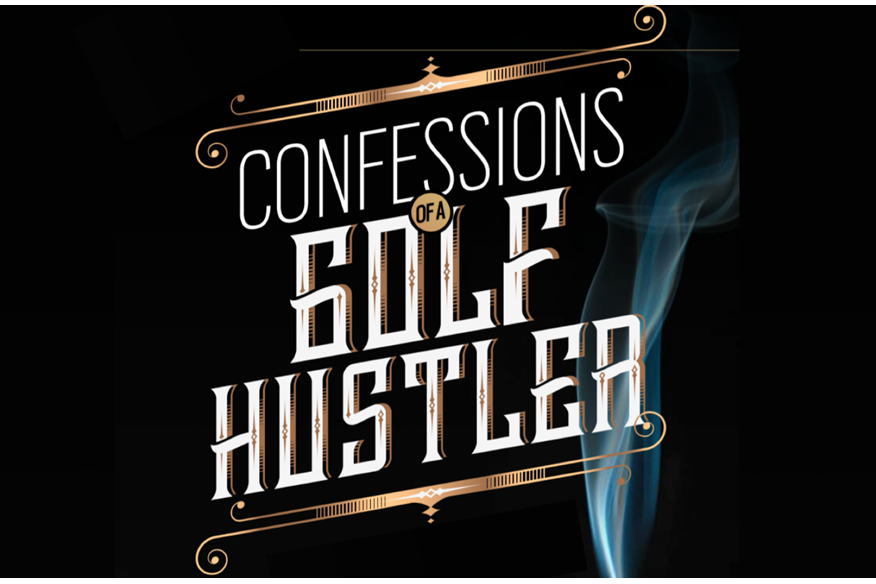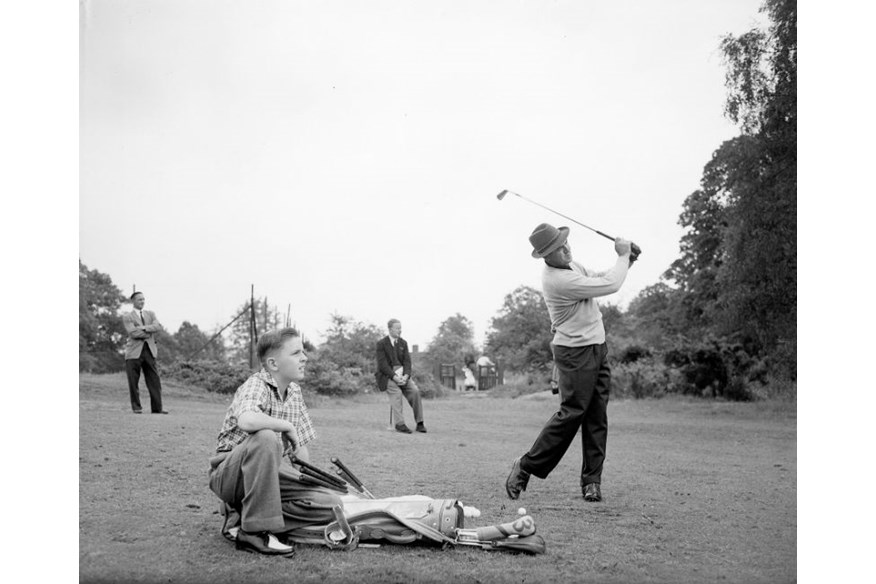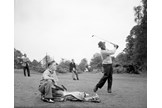Confessions of a golf hustler
Last updated:
How one man made a living by gambling on games with unsuspecting golfers… and beating them all:
Sam Snead isn’t the only golfer who likes a bet. In fact, we’d wager (there we go again) that EVERY golfer has played for something, whether it’s £1 front, £1 back and £1 overall, the first round after a game or something more significant.
One man who knows exactly what it’s like to win big – and win more often than not – is David (he’s asked us not to publish his real name). He is one of the most successful golf hustlers in Europe.
After losing his job as a bar manager, David started playing golf for money. He was playing off four, and he was good at hustling. Soon he was making a living, then a good living as he played more and got better. He is now a +2 handicapper… but you wouldn’t know that if you saw him top tee shots on the range and miss tap-in putts…
The financial climate may mean that the big money games have all dried up now -but David says it was good fun while it lasted. Read his story below…
HOW I STARTED. . .
For over three years, I did nothing but play golf for money. I’ve always played for a bit of money – without doubt, it teaches you to become a better golfer. I was 33 when I started making my living through it. I was a bar manager for five years and I started playing some money games.
One day I had a fight with my boss and I quit with just €180 in my pocket after going through a costly divorce. The following day I had my first money game and won €300. The next day I had another game and won €500. It seemed easy, like shelling peas. I had been working six days a week and making just over €1,000 a month for 60-70 hours a week.
Then, over two days, I’d won €800 just playing golf! The original plan was to play my way through the summer and hopefully take a holiday at the end of it. That summer lasted several years with no initial capital. At no point did I have more than €1,000 in my pocket, but I still paid the rent, alimony throughout and in the end I had to start working for real only because I ran out of opponents.
I suppose it was important my hustling got off to a good start: it taught me that I could handle myself under immense pressure and I would even tell myself ‘I’m going to win today because I know I’m going to win.’ That might sound conceited, but it’s got to be that way. If you don’t believe, the ball as sure as hell isn’t going to believe it. I didn’t play for huge amounts of money. It was just that if I didn’t win I’d have to start working again. I enjoyed it. I started to accumulate winnings and it was great to save money… I always played with money I won betting. I didn’t have any responsibilities. They were the best times I’ve had in my life!
HANDLING THE PRESSURE . . .
Hustling truly improved my game. I went from being a four-handicapper when I started to plus-two – a huge difference, but I’d still win! There was loads of pressure, but I loved it. It made me play better. I’ve probably played as many matches with money riding on the outcome as I have without any money involved, and I’ve shot several hundred rounds under par playing for money and just two without money being involved! I still haven’t learnt to get that focused when I’m not playing for money.
How did I improve? I stopped complaining, whining and getting down on myself. In the three seconds after the ball had stopped, I’d allow myself to swear – and that’s it. No more complaining after that. All that matters is the next shot. You have to accept where the ball is and do the best in the situation and I took all that on board. I realised you don’t have to play perfect golf to shoot par; you just have to make more birdies than bogeys. It sounds obvious, I know, but it’s not, because you put so much pressure on yourself because you think you’ve got to play perfect golf.
I’d typically have three games on at the same time, playing against three different people. And if you count it like that I didn’t lose a single game in the first six months – I made money every single day for six months. The best day was picking up €2,430, which I can vividly recall. I know it’s not a huge amount, but I started out playing for just €30!
It was a skins game against a guy who didn’t want to be given any shots because he used to be a pro. I won the first three holes and then he wanted to play for €60 per hole. Then he wanted to play for 120. I ended up winning the first 17 skins! I couldn’t do anything wrong and he didn’t have a chance. I was €1,630 up going to the last and he wanted to play it for €2,000! I said ‘no way!’ I’d won every hole and there’s no way I’m going to risk losing that money on the last. It’s not going to happen. I agreed to play for about half.
We were playing off the tips and I left myself 67m to the flag with the adrenaline pumping through my body. I don’t think I’ve hit a harder ball in my life and it finished a couple of metres from the hole. He wasn’t ever going to make par and I didn’t even try to make the birdie putt. That was a case of just responding positively to pressure instead of giving into it.
The mistake that most golfers make with pressure is that they think it is something bad… it’s not. You just have to learn to accept it, embrace it and handle it. Typically, people get nervous and then they get worried about being nervous. I get nervous and think ‘good, now I’m going to start playing better.’
Nearly all the Tour players play for money. Why? It’s the most similar thing to playing tournament golf. People think ‘I want to play well under pressure’, but to do that you have to practise playing under pressure. If you don’t practise it, how are you going to perform when crunch time arrives? There have been so many highlights but, for me, it was mainly about playing really good golf when I had to.
When I started hustling I’d never shot under par, but in my first gambling game, I shot a four-under- par 67, and in the next 10 rounds nine were under par. It was as if I had just pulled the plug out. I recall early doors losing a big bucks match, mainly because towards the nervy end I was trying to steer the ball. I was under extreme pressure and I wasn’t used to that level of pressure. I got very upset with myself for losing. But it convinced me to carry on to get used to the pressure.
THE OPPONENTS . . .
My favourite opponent was a former Olympic speed skater and a member of MENSA. He’s a genius. We played four times in a week and the situation was exactly the same: if I didn’t win on the 18th hole against him, I’d have lost money. We came to the fifth game and yet again it was the same scenario… if I don’t win the 18th, I’d lose money. I hit a good drive, but it just drifted right, behind a tree. I had 182m left, so I took out my driver and deliberately hit the biggest slice I’ve ever hit. The ball landed just inches behind the hole!
My opponent took a club and snapped it across his knee. I’m not sure how many f-bombs he dropped, but it was at least 30, followed by: “Not even Tiger Woods can do that. I’m never ever going to play golf with you again. You’re impossible to beat.” It only won me a modest €150, though had I not pulled off that miracle shot, it would have cost me double that. Sometimes it’s not the size of the win that counts, it’s just winning.
One guy in the construction business would regularly hit the ball into the bushes off the tee and typically I’d bet him that he couldn’t get it into the hole in seven. Most of the time he failed miserably much to my delight.
Another guy bet on my results: I remember on a par 5, I hit a good drive and he said ‘5,000 pesetas if you make a birdie, but you pay me 10,000 if you make a par.’ I accepted it on the proviso that I get 25,000 (£150) if I make an eagle. I hit the second shot just short of the green and then chipped it in! I’m jubilant, but he wasn’t a happy bunny and blurted “don’t you ever laugh at me when you’re taking my money!”
THE GAMESMANSHIP . . .
Did I use any gamesmanship? Do bears crap in the woods? But not as much as you’d think and certainly not unless my opponents tried it with me first. I’d always talk to myself. It’s impossible to think about a positive and a negative thought at the same time, so I’d see the ball flight and walking towards the ball in my pre- shot routine I’d remind myself that ‘I’ve got the biggest balls so use them well.’ That was my phrase; not loud, but they’d hear it.
Another thing I always liked to say after hitting an unbelievable shot was: “It’s true what my mum says.” My opponents would always ask ‘what?’ My reply was: “That when I’m under pressure, I’m awesome.”
I did those things to get inside people’s heads, but I wouldn’t mention there’s out of bounds over there or cough in their backswing because they can do that to you. However, I remember playing a couple of semi-gangster Englishmen, not nice people, and they tried a lot of gamesmanship. If the match had ended as it was on the 15th tee I’d have lost €300, but I only had €23 in my pocket and had to pay €21 of that for the green fee. To make things worse, my car had no fuel so I had no way of getting home. I had to win. I couldn’t breathe.
On the tee I pulled the club back and one of my opponents moved, so I stopped, looked at him and said: “If you do that again, we’re going to have a problem.” He apologised, but I pointed out that it was the third or fourth time he’d done it. Instead of being nervous, I got angry and got my breathing going again. I smoked the drive and then my wedge shot spun back next to the hole for birdie; on the next hole I got up and down from a greenside bunker for another birdie, parred the following par 3 and on the 18th hit driver-driver and got on the green and two putted for birdie. Instead of losing €300 I ended up winning €500. But
I’m convinced if they hadn’t used gamesmanship on the 15th tee, I’d have lost that game. They came back for more the following day, didn’t move a bit, were well behaved… and I took about €800 off them!
Parting Shots . . .
Overall, I reckon I won between 80-90% of my matches, a pretty good record. I even took money off a couple of well-known European Tour players. I thought about branching out for the bigger money on offer in places like Las Vegas, Arizona or Marbella, but the truth is I never really had the travel money. But I was convinced I could beat practically anybody. I miss it.
It was the best time of my life. The money games have dried up now. The black money – unpaid taxes – isn’t around now following the financial crash a few years ago, and those prepared to play for a few hundred euros a game now play for €10. You can’t making a living that way, it’s impossible. It was good fun while it lasted, though.
HUSTLING DOS AND DON’TS . . .
DO: Make sure you’re confident in your short putts, because you have to hole putts.
DO: Pull off some spectacular short game shots that your opponents can’t do – that will demoralise them.
DO: Be positive, and always think of the best-case scenario.
DON’T: Turn up with the latest equipment and looking smart; make out you’re just an average amateur.
DO: Start slowly so you can lull your opponent into a false sense of security, which can lead to them getting complacent.
DON’T: Hit too many balls on the range and make sure you strike the odd dodgy shot here or there
Famous Hustlers In The Game . . .
TITANIC THOMPSON
Arguably the most well known golf hustler was a gambler, a conman and a scratch golfer – right or left handed! Sam Snead and Al Capone’s men were to be among his victims.
SAM SNEAD
The seven-time major champion even wrote a book on the subject and almost certainly won considerably more money hustling than he did on Tour
JIM THORPE
The three-time PGA Tour winner had a ball hustling. He once picked up 55,000 in Detroit and claims, “I won the matches before I teed off.”
DEREK JETER
The New York Yankee took on and beat former US president Barack Obama, who realised he’d been hustled after the opening hole.. Jeter’s only request was to have his picture taken with Obama handing him his winnings



